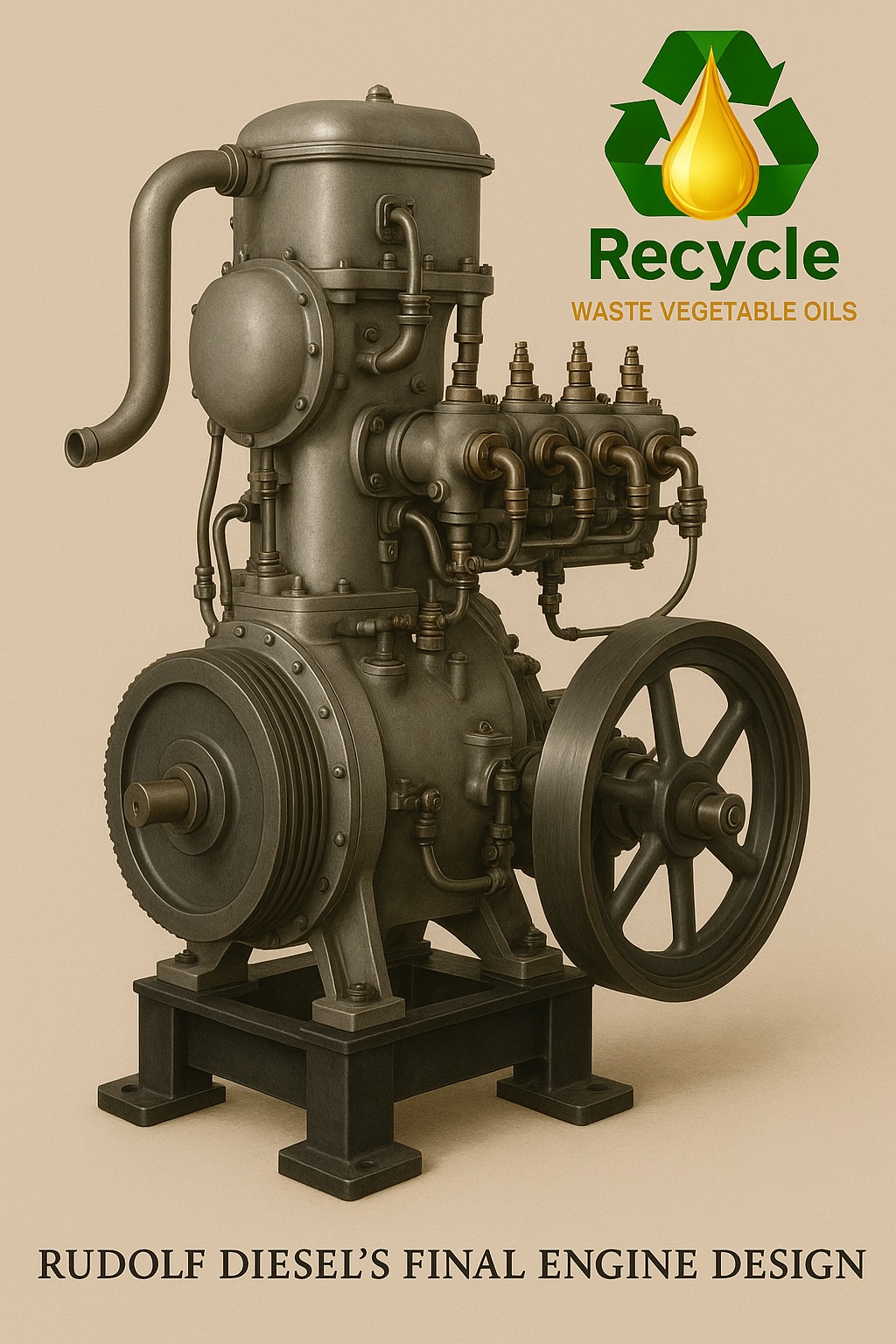Home / About / Services / Contact / North Yorkshire / East Riding Yorkshire / South Yorkshire / West Yorkshire / Greater Manchester / Derbyshire / Reference / FAQ

Rudolf Diesel’s Final Diesel Engine
In the final years of his life, Rudolf Diesel was not only refining his groundbreaking invention—the diesel engine—but also shaping a profound vision for a sustainable and equitable energy future. Unlike many inventors of his era, Diesel foresaw the risks of reliance on fossil fuels and sought to create an engine that could operate using alternative, locally-sourced fuels.
The culmination of his engineering career was a robust, efficient engine capable of running on natural vegetable oils such as peanut oil and what we today call waste vegetable oil. His innovation was not limited to mechanics—it extended into social philosophy. Diesel hoped his engine would empower small-scale industries, farmers, and developing communities by giving them control over their energy sources.
The Engine That Changed the Future
Diesel's final engine design was a refinement of his earlier prototypes but included improvements in pressure tolerance, combustion efficiency, and fuel flexibility. In demonstrations, it successfully ran on a variety of vegetable-based oils. At the 1900 World Exhibition in Paris, Diesel famously showcased his engine running on 100% peanut oil, astonishing audiences and sparking conversations about fuel independence.
He emphasized that these engines were designed to accommodate renewable oils derived from plants, including rapeseed, castor oil, and other biomass-derived fuels. This adaptability made the engine a potentially transformative tool in a world still heavily dependent on coal and kerosene at the time.
Fueling with Waste Vegetable Oil
Although Diesel’s original tests used pure oils, today’s advancements allow his engine concept to thrive with fuels such as waste vegetable oil (WVO). This byproduct of cooking processes is now collected, filtered, and processed into clean-burning biodiesel that is compatible with modified diesel engines. In fact, Diesel’s engine architecture was naturally suited for high-viscosity fuels, making it ideal for biofuel use even by today’s standards.
Waste vegetable oil not only offers a low-cost alternative to fossil fuels but also contributes to waste reduction and circular economy goals. By reusing oil that would otherwise be discarded, the fuel becomes a powerful symbol of sustainable innovation—precisely the kind of solution Diesel himself championed.
Rudolf Diesel’s Vision Before His Disappearance
In the weeks before his mysterious disappearance aboard the SS Dresden in 1913, Rudolf Diesel was more vocal than ever about his hope for energy democratization. He believed strongly that rural farmers should be able to grow their own fuel crops and power their equipment using bio-oils without relying on expensive, monopolized petroleum systems.
Diesel wrote extensively about the potential for vegetable oil fuel to support self-sufficiency, especially in developing regions. He envisioned a world where developing nations could leapfrog fossil dependency and move directly into renewable fuel economies. His words from over a century ago resonate deeply today as the world turns urgently toward sustainable energy solutions.
Continuing the Legacy Through Innovation
Today, Diesel’s principles live on in many ways. Waste vegetable oil is being used around the world to produce biodiesel for transport, machinery, and even aviation. Regulatory frameworks like the UK's Renewable Transport Fuel Obligation (RTFO) now encourage fuel providers to include renewable fuels in their supply chains—many of which rely on waste oils.
Modern biodiesel processors and fuel stations continue to adapt Rudolf Diesel’s timeless engine concept, merging his 19th-century ingenuity with 21st-century environmental needs. From off-grid farms to urban fleet vehicles, the applications of waste vegetable oil as a fuel source continue to expand globally.
Our Role in the Modern Biofuel Landscape
We proudly contribute to Rudolf Diesel’s legacy by collecting and recycling waste vegetable oils from commercial kitchens, food manufacturers, and hospitality venues. Our environmentally conscious collection service ensures that used oils are given a second life—transformed into clean, renewable fuel that helps reduce carbon emissions and landfill waste.
Whether you run a small takeaway, a large restaurant, or a mobile catering business, partnering with our waste oil collection service supports a larger movement toward sustainability—one Diesel would have surely championed.
Conclusion: The Engine, The Fuel, The Future
Rudolf Diesel’s final engine wasn’t just a mechanical triumph—it was a philosophical statement. Built to operate on renewable oils, it remains a beacon of innovation more than 100 years later. As we face global challenges around climate change and energy equity, Diesel’s dream of accessible, sustainable fuel for all is not only relevant—it’s essential.
By recycling waste vegetable oil into biofuel, we honour the intent behind Diesel’s invention and help steer the world toward a cleaner, more circular future.
Last updated - 13/06/2025






